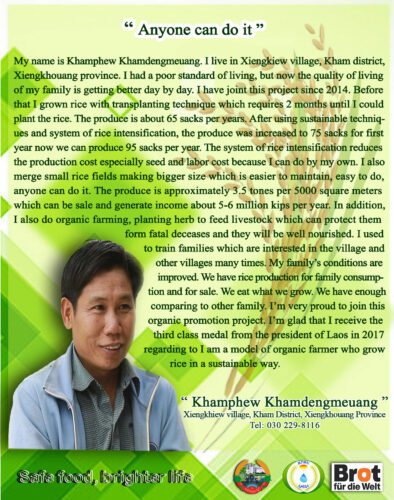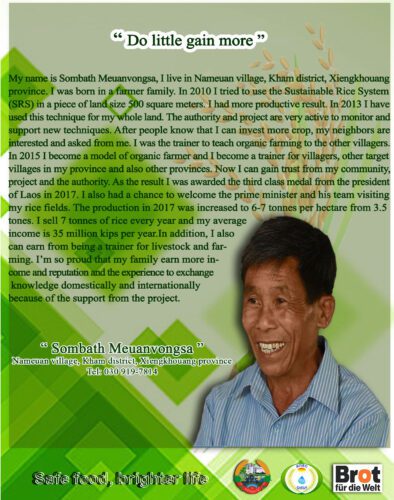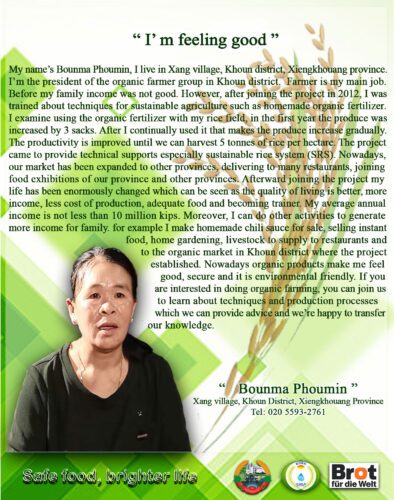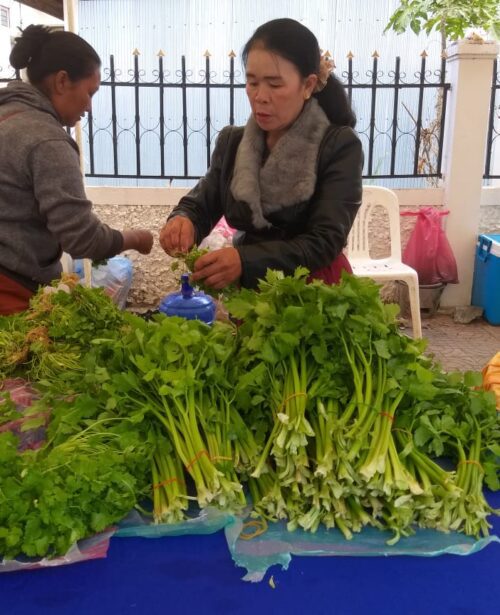““I had a poor standard of living,” admits Khamphew Khamdengmeuang, a farmer living in Xiengkiew village in Kham district, one of the five districts in the province of Xiengkhouang in Laos PDR, where the Commercial Organic Farming and its Institutionalisation (COFI) program was mounted by Sustainable Agriculture and Environment Development Association (SAEDA) in partnership with Bread of the World.
Before learning sustainable techniques and the system of rice intensification (SRI), Khamphew’s annual rice production was 65 sacks. In his first year of SRI, his annual harvest grew by an additional 10 sacks. “Now we can produce 95 sacks a year … we have rice production for family consumption and for sale. The quality of living of my family is getting better day by day.”
 Experiencing such a turnaround is shared by Bounma Phoumin, another farmer, this time from Xang village in Khoun district where COFI was similarly implemented. “Before, my family income was not good.” Learning and applying sustainable agriculture techniques, such as making one’s own organic fertilizer, and receiving technical support on sustainable rice systems (SRS), she saw her yield gradually increase, and now she can harvest five tonnes of rice per hectare.
Experiencing such a turnaround is shared by Bounma Phoumin, another farmer, this time from Xang village in Khoun district where COFI was similarly implemented. “Before, my family income was not good.” Learning and applying sustainable agriculture techniques, such as making one’s own organic fertilizer, and receiving technical support on sustainable rice systems (SRS), she saw her yield gradually increase, and now she can harvest five tonnes of rice per hectare.
 Born into a farmer family, Sombath Meuanvongsa from Nameuan village in Kham district shifted his entire land to SRS as soon as he saw productive results in the 500sqm parcel where he tested it.
Born into a farmer family, Sombath Meuanvongsa from Nameuan village in Kham district shifted his entire land to SRS as soon as he saw productive results in the 500sqm parcel where he tested it.
Designed to help improve the income of smallholder farmers and provide them with better access to market opportunities, COFI trained farmer recipients in integrated agriculture, Sustainable Rice Systems, biocomposting, and the preparation of bio-extract and herbal repellents.
The farmers in the COFI program appreciate how, with these sustainable practices, their cost of production has decreased, increasing their income and freeing it up to meet the needs of their families.They appreciate how they have adequate food to eat, and are also able to earn extra income from other activities like selling organic livestock to restaurants and homemade instant food and homemade condiments like chili sauce. Khamphew is able to protect his livestock from diseases by feeding them the herbs he grows organically.
“Organic products make me feel good, secure. And it is environmentally friendly,” Bounma shares. “We have enough compared to other families,” Khamphew adds.
Neighbors witnessing improvements in the quality of life of the participating farmers were keen to learn from them–and it is something they take pride in sharing. Sombath feels good about being a trainer in different villages and provinces, not just his own hometown. He likes the experience of exchanging knowledge from farmers at home and abroad.
 “My life has been enormously changed, which can be seen as the quality of living is better. We’re happy to transfer our knowledge,” Bounma says.
“My life has been enormously changed, which can be seen as the quality of living is better. We’re happy to transfer our knowledge,” Bounma says.
(The stories of Bounma, Khamphew, and Sombath are adapted from the “10 Model Farmers on Organic Agriculture”, with permission from Sustainable Agriculture and Environment Development Association.)”


